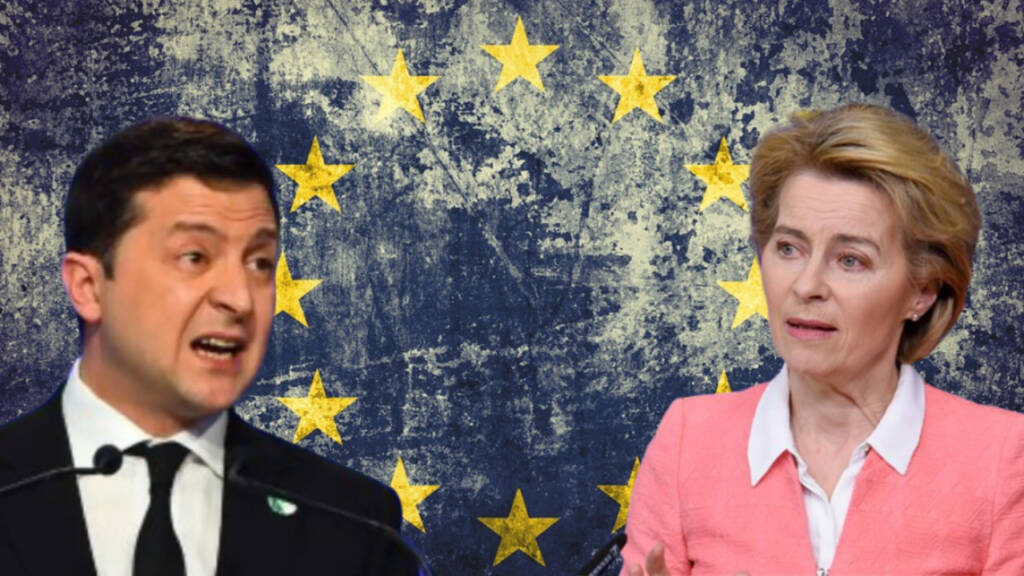As Western support for Ukraine appears to waver and concerns over corruption grow, President Zelensky has issued a dreadful warning to the EU. It sounds like a threat simply based on words. But all it is are empty words.
Ukrainian President Volodymyr Zelensky has subtly issued a warning to the European Union (EU). Zelensky cautions that EU nations offering shelter to Ukrainian refugees could provoke Ukrainian resentment if they reduce assistance to Kyiv.
He voices apprehension about a perceived decline in Western governments’ support for Ukraine, evident in their conduct during meetings. Zelensky contends that failing to back Ukraine implies aligning with Russia in the ongoing conflict since February 2022.
Zelensky’s Warning for Brussels
He emphasizes that Western leaders, by “losing Ukraine,” risk electoral defeats and backlash from their constituents. While millions of Ukrainian refugees in Western Europe generally exhibit good behavior, any mistreatment could potentially lead to an unfavorable shift in the situation.
In recent days, President Zelensky seems to have received a subtle message: Western leaders may be distancing themselves from the Ukrainian conflict as several leaders have shifted their tones against Russia. Notably, the recent visit of US Secretary of State Anthony Blinken to Kyiv differed from previous visits.
During this visit, Blinken refrained from condemning Russia’s actions in Ukraine and denied any involvement in supplying ATACMS systems to Kyiv. In a parallel development, US military general Mark Milley also indicated his belief that the Ukrainian counteroffensive may not extend beyond 30 days.
These developments suggest a potential shift in Western support for Ukraine and a recalibration of their stance on the ongoing conflict.
Read More: Stoltenberg instructs Zelensky to surrender eastern Ukraine
Ukraine’s Integrity Crisis: EU Diplomats Sound the Alarm
The European Union (EU) is now echoing concerns raised by the United States. Brussels and EU member states have begun voicing criticisms regarding Ukraine, particularly focusing on issues of corruption within the country. Several EU diplomats have expressed alarm over the pervasive corruption in Ukraine, characterizing it as a “very corrupt country.”
These diplomats are apprehensive that recent anti-corruption efforts initiated by President Zelensky may not be sufficient to address the deep-rooted issue, causing concerns in Brussels.
One contentious proposal from Zelensky involves granting more authority to Ukraine’s intelligence services for investigating corruption, a move that has garnered criticism for its potential implications. Additionally, during a surprise visit to Kyiv, German Foreign Minister Annalena Baerbock cautioned that Ukraine’s corruption problem is escalating.
She urged Ukraine to intensify its anti-corruption efforts, emphasizing that there is still progress needed in implementing anti-oligarch laws and tackling corruption. Furthermore, there are rumors that Germany has denied supplying Taurus missiles to Ukraine, citing concerns related to corruption.
Kuleba’s Mind Games: The Subtext of His Remark to Baerbock
And so, Ukraine has opted to issue threats to the EU. President Zelensky’s recent statements align with Foreign Minister Dmytro Kuleba’s actions from last week, where he openly mocked German Foreign Minister Baerbock, stating, “You will supply us with missiles eventually; it’s just a matter of time.” Therefore discarding Germany’s concerns altogether.
While President Zelensky’s warnings to the EU are stern, the likelihood of Ukrainians rallying behind him appears slim. Firstly, Zelensky’s popularity within Ukraine has plummeted significantly. Recent studies indicate that the vast majority of Ukrainians hold him accountable for the widespread problems in the government and military, with 78% directly attributing the issue to him.
Moreover, reports from POLITICO suggest that a substantial number of Ukrainians who have returned to their homeland express dissatisfaction with Ukraine’s approach towards Russia. Many also anticipate another “Euromaidan” uprising in the future. These sentiments raise doubts about widespread support for Zelensky’s stance.
Read More: A New Perspective on Putin’s Actions in Ukraine
Thus, while Zelensky’s warnings are clear, the extent of support from Ukrainians within and outside Europe remains uncertain given these prevailing sentiments.
In 2022, President Biden criticized Zelensky for what he perceived as endless demands. It appears that in 2023, Western focus on Ukraine may finally wane, leaving Zelensky in a precarious position. The evolving situation could pose challenges for Ukraine’s leadership and may change the path of the conflict.
Watch More:
